Saeed Ahmed, MD, FAPA, FASAM
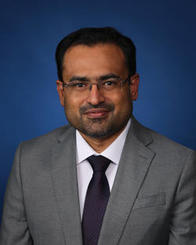 Dr. Saeed Ahmed, MD, FAPA, FASAM is an Adiction Psychiatrist with triple board certifications from the American Board of Psychiatry and Neurology in General Adult Psychiatry and Addiction Psychiatry, and from the American Board of Preventive Medicine in Addiction Medicine.
Dr. Saeed Ahmed, MD, FAPA, FASAM is an Adiction Psychiatrist with triple board certifications from the American Board of Psychiatry and Neurology in General Adult Psychiatry and Addiction Psychiatry, and from the American Board of Preventive Medicine in Addiction Medicine.
At present, he serves as an Assistant Professor of Psychiatry at the University of Connecticut (UConn) and as the Medical Director for Addiction Services and the Dual Diagnosis Unit at the Department of Behavioral Health, Saint Francis Hospital and Medical Center, Hartford, CT. He also fills the role of Medical Director of the Opioid Treatment Program at the Saint Francis Hospital and Medical Center/Mount Sinai Hospital in Hartford, CT.
His education includes a general psychiatry residency at Nassau University Medical Center in East Meadow, New York, and an Addiction Psychiatry fellowship at the Boston University Medical Center/VA Boston Healthcare System.
Dr. Ahmed’s work primarily focuses on substance use disorders, covering a range of topics including the micro-induction of Buprenorphine/Naloxone, Kratom addiction, the potential therapeutic role of psychedelics in addiction and mental health conditions, the off-label “”repurposing”” of medications in substance use disorders, harm reduction, and strategies to enhance access to and reduce barriers to treatment for substance use disorders.
He maintains active involvement with the American Psychiatric Association (APA), the American Academy of Addiction Psychiatry (AAAP), and the American Society of Addiction Medicine (ASAM) in various capacities. As a former AADPRT Nyapati Rao/Francis Lu International Medical Graduate (IMG) Fellow, Dr. Ahmed has a distinct interest in mentoring IMGs seeking residency or fellowship training in the United States.
Ricky Bluthenthal, PhD
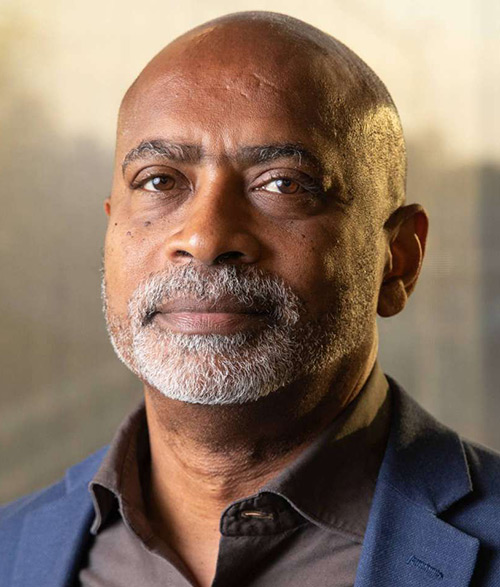 Distinguished Professor of Population and Public Health Sciences (PPHS) in the Keck School of Medicine (KSOM) at the University of Southern California. Nice Chair for Equity, Diversity and Inclusion at the University of Southern California. Associate Dean for Social Justice at the University of Southern California. Published over 190 studies in peer-reviewed scientific journals such as the American Journal of Public Health, Addiction, Alcoholism: Clinical and Experimental Research, Social Science and Medicine, and Health Services Research.
Distinguished Professor of Population and Public Health Sciences (PPHS) in the Keck School of Medicine (KSOM) at the University of Southern California. Nice Chair for Equity, Diversity and Inclusion at the University of Southern California. Associate Dean for Social Justice at the University of Southern California. Published over 190 studies in peer-reviewed scientific journals such as the American Journal of Public Health, Addiction, Alcoholism: Clinical and Experimental Research, Social Science and Medicine, and Health Services Research.
Ebony Caldwell, MD, MPH
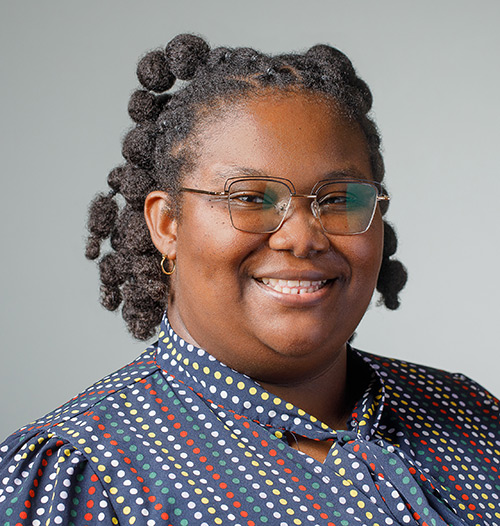 Ebony Caldwell, MD, MPH is a Georgia native who completed their general psychiatry residency training at Howard University Hospital (HUH) in Washington, DC, where they served as Chief Resident, an APA/APAF Leadership Fellow, HBCU C.A.R.E.S. Behavioral Health Ambassador, and REACH scholar. Dr. Caldwell completed Addiction Psychiatry fellowship at Yale School of Medicine. They have served on national leadership for the American Academy of Addiction Psychiatry, and recently was a 2023-2024 APA Jeanne Spurlock Congressional Fellowship, working in the U.S. House of Representatives. Dr. Caldwell will continue their career in medical education and policy work, focusing on increasing access to psychiatric treatment in marginalized communities and building a representative mental health workforce as an assistant professor at Howard University Hospital.
Ebony Caldwell, MD, MPH is a Georgia native who completed their general psychiatry residency training at Howard University Hospital (HUH) in Washington, DC, where they served as Chief Resident, an APA/APAF Leadership Fellow, HBCU C.A.R.E.S. Behavioral Health Ambassador, and REACH scholar. Dr. Caldwell completed Addiction Psychiatry fellowship at Yale School of Medicine. They have served on national leadership for the American Academy of Addiction Psychiatry, and recently was a 2023-2024 APA Jeanne Spurlock Congressional Fellowship, working in the U.S. House of Representatives. Dr. Caldwell will continue their career in medical education and policy work, focusing on increasing access to psychiatric treatment in marginalized communities and building a representative mental health workforce as an assistant professor at Howard University Hospital.
Fabiola Arbelo Cruz, MD
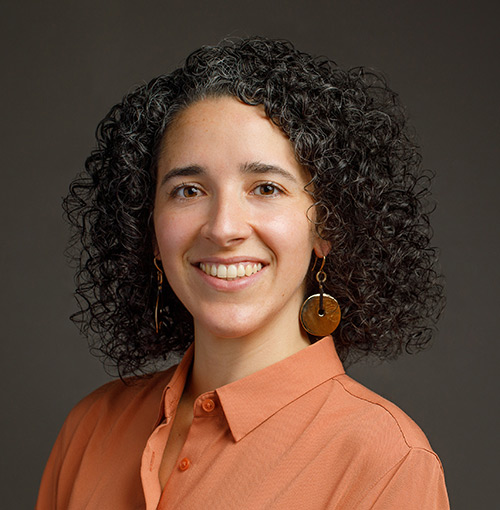 Dr. Fabiola Arbelo Cruz (she/her/ella) is an Assistant Professor of Psychiatry at Yale School of Medicine and Attending Addiction Psychiatrist at the Connecticut Mental Health Center (CMHC) in New Haven, CT. She is a proud past REACH scholar from cohort 2020-2021. Currently, she provides outpatient psychiatric and addiction care to patients with severe mental Illness. One of her roles at CMHC includes working with the Street Psychiatry team, a mental health and addiction care delivery model that takes physicians and other providers to the streets to provide care to people experiencing unsheltered homelessness. Her academic interests include racial inequities in substance use treatment, substance use treatment in Latinx communities, stigma of addictive disorders and their treatment, and medical education.
Dr. Fabiola Arbelo Cruz (she/her/ella) is an Assistant Professor of Psychiatry at Yale School of Medicine and Attending Addiction Psychiatrist at the Connecticut Mental Health Center (CMHC) in New Haven, CT. She is a proud past REACH scholar from cohort 2020-2021. Currently, she provides outpatient psychiatric and addiction care to patients with severe mental Illness. One of her roles at CMHC includes working with the Street Psychiatry team, a mental health and addiction care delivery model that takes physicians and other providers to the streets to provide care to people experiencing unsheltered homelessness. Her academic interests include racial inequities in substance use treatment, substance use treatment in Latinx communities, stigma of addictive disorders and their treatment, and medical education.
Dr. Arbelo Cruz received her medical degree from Ponce Health Sciences University School of Medicine in Ponce, Puerto Rico. She trained in General Adult Psychiatry at Boston University/ Boston Medical Center, then completed an Addiction Psychiatry Fellowship at Yale.
Ricardo Cruz, MD
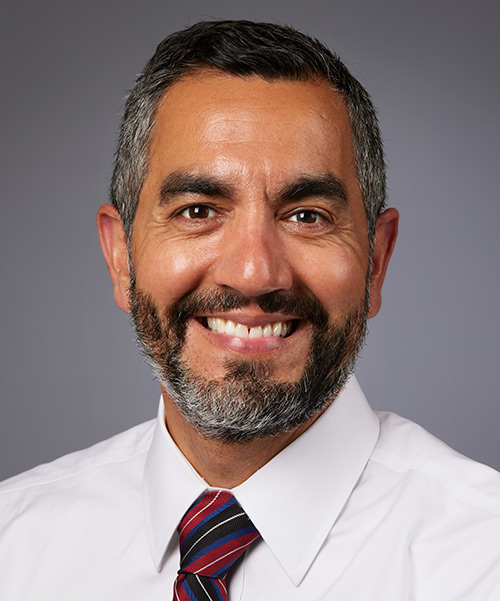 Ricardo Cruz, MD, MPH, MA, is an Assistant Professor of Medicine at the Boston University Chobanian and Avedisian School of Medicine (BUCASM) and Boston Medical Center (BMC). He is a graduate of BUCASM and the Boston University School of Public Health. He completed his clinical training at BUCASM/Boston Medical Center Internal Medicine Residency Primary Care Training Program. Dr. Cruz joined BUCASM faculty in 2014 and his clinical work focuses on primary care and treatment of substance use disorders for vulnerable populations including racial and ethnic minoritized communities and individuals with history of criminal justice involvement. He is also a physician in the Faster Paths to Treatment, BMC’s innovative, low-barrier substance use disorder bridge clinic. He is a Clinician Educator at BUCASM and teaches medical students and trains Internal Medicine Residents in his various roles including the BUCASM Academy of Medical Educators, as an Associate Clerkship Director for the Internal Medicine 3rd year clerkship, and as Core Faculty of the Internal Medicine Primary Care Training Program. His research interests have included how peer recovery coaches can help engage and retain individuals with opioid use disorder into treatment and primary care services. He has been a principal investigator on a Department of Health and Human Services Office of Minority Health funded project and a co-investigator on NIAAA and NIDA-funded randomized clinical trials testing medications for alcohol and cocaine use disorders.
Ricardo Cruz, MD, MPH, MA, is an Assistant Professor of Medicine at the Boston University Chobanian and Avedisian School of Medicine (BUCASM) and Boston Medical Center (BMC). He is a graduate of BUCASM and the Boston University School of Public Health. He completed his clinical training at BUCASM/Boston Medical Center Internal Medicine Residency Primary Care Training Program. Dr. Cruz joined BUCASM faculty in 2014 and his clinical work focuses on primary care and treatment of substance use disorders for vulnerable populations including racial and ethnic minoritized communities and individuals with history of criminal justice involvement. He is also a physician in the Faster Paths to Treatment, BMC’s innovative, low-barrier substance use disorder bridge clinic. He is a Clinician Educator at BUCASM and teaches medical students and trains Internal Medicine Residents in his various roles including the BUCASM Academy of Medical Educators, as an Associate Clerkship Director for the Internal Medicine 3rd year clerkship, and as Core Faculty of the Internal Medicine Primary Care Training Program. His research interests have included how peer recovery coaches can help engage and retain individuals with opioid use disorder into treatment and primary care services. He has been a principal investigator on a Department of Health and Human Services Office of Minority Health funded project and a co-investigator on NIAAA and NIDA-funded randomized clinical trials testing medications for alcohol and cocaine use disorders.
Ellen Edens, MD, MPE, MA
 Dr. Edens is an Assistant Professor of Psychiatry at Yale University School of Medicine. In 2002, Dr. Edens received her MD from the Johns Hopkins School of Medicine and completed psychiatry residency training and graduate work in psychiatric epidemiology at Washington University in St. Louis. She is board-certified in addiction psychiatry following advanced training in Addiction Psychiatry at Yale University School of Medicine, where she joined the faculty in 2011. Dr. Edens is the Associate Director of the Addiction Psychiatry Residency at Yale, an ACGME-accredited program, overseeing the program’s didactic curriculum and clinical supervision. She serves as co-director of the VA Interprofessional Advanced Fellowship in Addiction Treatment. Her clinical and research interests dovetail in the areas of co-occurring addiction and chronic pain and expansion of access to evidence-based treatments for addiction, particularly opioid and alcohol use disorders. She is the clinical co-director of the VA Opioid Reassessment Clinic, a clinic designed to assess the safety, efficacy, and misuse of opioids by Veterans treated with prescription opioids for chronic pain. Additionally, she is actively working on developing and disseminating interprofessional educational material on the topic of addiction screening, diagnosis, and initiation of substance use treatment.
Dr. Edens is an Assistant Professor of Psychiatry at Yale University School of Medicine. In 2002, Dr. Edens received her MD from the Johns Hopkins School of Medicine and completed psychiatry residency training and graduate work in psychiatric epidemiology at Washington University in St. Louis. She is board-certified in addiction psychiatry following advanced training in Addiction Psychiatry at Yale University School of Medicine, where she joined the faculty in 2011. Dr. Edens is the Associate Director of the Addiction Psychiatry Residency at Yale, an ACGME-accredited program, overseeing the program’s didactic curriculum and clinical supervision. She serves as co-director of the VA Interprofessional Advanced Fellowship in Addiction Treatment. Her clinical and research interests dovetail in the areas of co-occurring addiction and chronic pain and expansion of access to evidence-based treatments for addiction, particularly opioid and alcohol use disorders. She is the clinical co-director of the VA Opioid Reassessment Clinic, a clinic designed to assess the safety, efficacy, and misuse of opioids by Veterans treated with prescription opioids for chronic pain. Additionally, she is actively working on developing and disseminating interprofessional educational material on the topic of addiction screening, diagnosis, and initiation of substance use treatment.
Ernest Egu, MD
 Ernest Egu, MD currently functions as both the Ambulatory Medical Director and Medical Director of Correctional Addiction Medicine at the Cooper Center for Healing at Bridgeview in the Division of Addiction Medicine at Cooper University Health Care in Camden, NJ. He is dual boarded in Family Medicine and Addiction Medicine. Dr. Egu obtained his bachelors degree in Cell Biology and Neuroscience from Rutgers University then graduated from Cooper Medical School of Rowan University in Camden, NJ. He went on to complete residency at Montefiore Medical Center in the Department of Family and Social Medicine where he was awarded the departmental awards for Distinction in Health Equity and Antiracism for his work on Health Equity Rounds. He completed an ACGME accredited fellowship in Addiction Medicine at Montefiore Medical Center. His interests include caring for marginalized populations, treatment of substance use disorders, medical education, health equity and antiracism, preventive care, and mentoring scholars in health careers.
Ernest Egu, MD currently functions as both the Ambulatory Medical Director and Medical Director of Correctional Addiction Medicine at the Cooper Center for Healing at Bridgeview in the Division of Addiction Medicine at Cooper University Health Care in Camden, NJ. He is dual boarded in Family Medicine and Addiction Medicine. Dr. Egu obtained his bachelors degree in Cell Biology and Neuroscience from Rutgers University then graduated from Cooper Medical School of Rowan University in Camden, NJ. He went on to complete residency at Montefiore Medical Center in the Department of Family and Social Medicine where he was awarded the departmental awards for Distinction in Health Equity and Antiracism for his work on Health Equity Rounds. He completed an ACGME accredited fellowship in Addiction Medicine at Montefiore Medical Center. His interests include caring for marginalized populations, treatment of substance use disorders, medical education, health equity and antiracism, preventive care, and mentoring scholars in health careers.
Holly Hagle, PhD
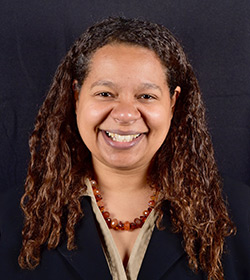 Holly Hagle, Ph.D. is an Associate Research Professor at the Collaborative Center to Advance Health Services at the University of Missouri-Kansas City’s School of Nursing and Health Studies. Her research is in implementation science and addiction health services. She has expertise utilizing secondary data sets such as the National Survey on Drug Use and Health and Cerner Health Facts database. She is the Principal Investigator (PI) for the Prevention Technology Transfer Center (PTTC) NCO, Senior Advisor for the Addiction Technology Transfer Center (ATTC) Network Coordinating Office and UMKC PI and Co-Director on behalf of the ATTC Network for the Opioid State Targeted Response Technical Assistance (STR-TA) grant.
Holly Hagle, Ph.D. is an Associate Research Professor at the Collaborative Center to Advance Health Services at the University of Missouri-Kansas City’s School of Nursing and Health Studies. Her research is in implementation science and addiction health services. She has expertise utilizing secondary data sets such as the National Survey on Drug Use and Health and Cerner Health Facts database. She is the Principal Investigator (PI) for the Prevention Technology Transfer Center (PTTC) NCO, Senior Advisor for the Addiction Technology Transfer Center (ATTC) Network Coordinating Office and UMKC PI and Co-Director on behalf of the ATTC Network for the Opioid State Targeted Response Technical Assistance (STR-TA) grant.
Orman Trent Hall, DO
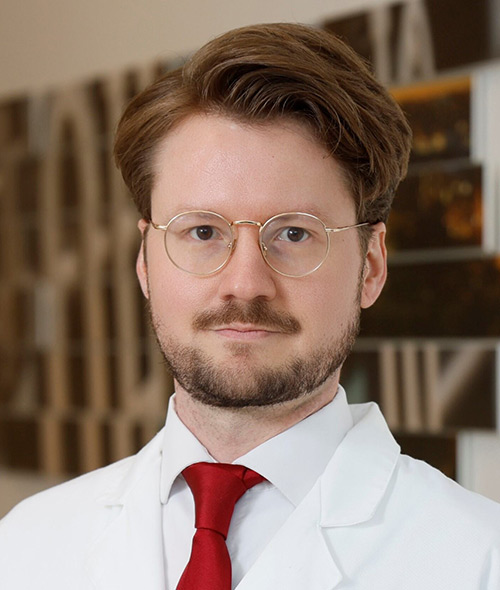 Dr. Hall’s research has included the epidemiology of accidental drug overdose, brain mechanisms linking chronic pain and addiction, clinical phenotyping of opioid use disorder and alcohol use disorder based on emotional/motivational aspects of withdrawal, addiction stigma, and health equity in addiction treatment. Dr. Hall Co-Leads the Healthy State Alliance Addiction Initiative (HSA-AI) a collaboration between OSUWMC and Bon Secours Mercy Health jointly combatting the addiction crisis in Ohio through education, clinical care and research.
Dr. Hall’s research has included the epidemiology of accidental drug overdose, brain mechanisms linking chronic pain and addiction, clinical phenotyping of opioid use disorder and alcohol use disorder based on emotional/motivational aspects of withdrawal, addiction stigma, and health equity in addiction treatment. Dr. Hall Co-Leads the Healthy State Alliance Addiction Initiative (HSA-AI) a collaboration between OSUWMC and Bon Secours Mercy Health jointly combatting the addiction crisis in Ohio through education, clinical care and research.
Lamia Haque, MD, MPH
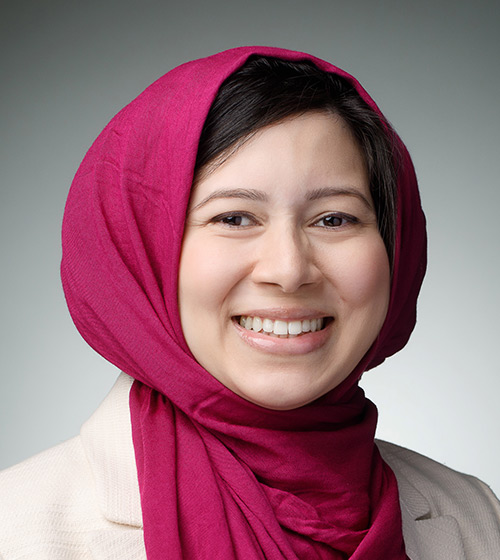 Lamia Haque, MD, MPH is an Assistant Professor in the Department of Internal Medicine – Section of Digestive Diseases at Yale School of Medicine as well as a Core Faculty Member in the Yale Program in Addiction Medicine. She received her medical degree from the Warren Alpert Medical School of Brown University and completed her residency in Internal Medicine as well as fellowship training in Addiction Medicine, Digestive Diseases, and Advanced/Transplant Hepatology at Yale School of Medicine. As an addiction medicine specialist and hepatologist, her scholarly and educational efforts have focused on optimizing outcomes for individuals with liver diseases and addiction, specifically alcohol-associated liver disease and chronic hepatitis C infection. In addition to her research, she cares for patients at the Yale Clinic for Alcohol and Addiction Treatment in Hepatology where patients receive integrated care for liver disease and addiction.
Lamia Haque, MD, MPH is an Assistant Professor in the Department of Internal Medicine – Section of Digestive Diseases at Yale School of Medicine as well as a Core Faculty Member in the Yale Program in Addiction Medicine. She received her medical degree from the Warren Alpert Medical School of Brown University and completed her residency in Internal Medicine as well as fellowship training in Addiction Medicine, Digestive Diseases, and Advanced/Transplant Hepatology at Yale School of Medicine. As an addiction medicine specialist and hepatologist, her scholarly and educational efforts have focused on optimizing outcomes for individuals with liver diseases and addiction, specifically alcohol-associated liver disease and chronic hepatitis C infection. In addition to her research, she cares for patients at the Yale Clinic for Alcohol and Addiction Treatment in Hepatology where patients receive integrated care for liver disease and addiction.
Brady Heward, MD
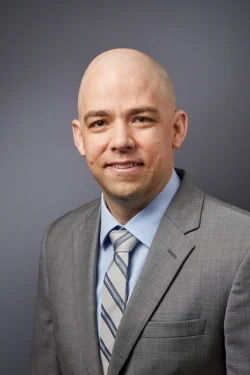 Brady Heward, MD, is an Assistant Professor of Psychiatry at the University of Vermont (UVM) Larner College of Medicine and a Clinical Instructor at Yale University School of Medicine. Dr. Heward attended medical school and subsequently completed residency in general psychiatry at Yale. Following residency, Dr. Heward participated in a public psychiatry fellowship at Yale, followed by a child and adolescent psychiatry fellowship at UVM. He returned to Yale to complete his addiction psychiatry fellowship. He is board certified in Psychiatry, Child and Adolescent Psychiatry and Addiction Psychiatry.
Brady Heward, MD, is an Assistant Professor of Psychiatry at the University of Vermont (UVM) Larner College of Medicine and a Clinical Instructor at Yale University School of Medicine. Dr. Heward attended medical school and subsequently completed residency in general psychiatry at Yale. Following residency, Dr. Heward participated in a public psychiatry fellowship at Yale, followed by a child and adolescent psychiatry fellowship at UVM. He returned to Yale to complete his addiction psychiatry fellowship. He is board certified in Psychiatry, Child and Adolescent Psychiatry and Addiction Psychiatry.
Dr. Heward currently works at an outpatient addiction treatment center in Vermont and on an inpatient psychiatry unit in a rural hospital in Northeastern New York. He is Co-Director of Clinical Affairs for the UVM Center on Rural Addiction (CORA), funded by HRSA, and works to provide education and mentorship to rural practitioners and clinicians on the treatment of substance use disorders. His academic and research interests include understanding the impact of medical training on stigma towards people who use drugs, how families communicate about drug use, and the role of prevention, treatment, and harm reduction in adolescents.
Oluwole Jegede, MD, MPH
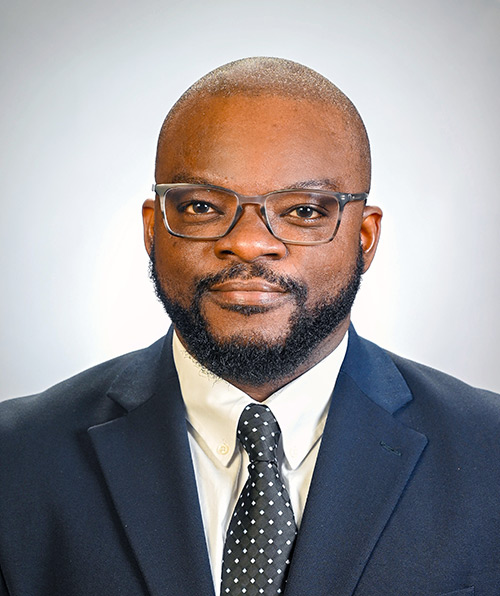 Oluwole Jegede, MD, MPH is an Assistant Professor of Psychiatry at the Yale School of Medicine, and Affiliated Faculty, Equity Research and Innovation Center (ERIC), Yale University, New Haven, CT. Oluwole is a physician-scientist with joint clinical appointment as Addiction Psychiatrist, Medical Director of the Medication for Addiction Treatment (MAT) clinic and Yale Medical Student Site-Director at the Connecticut Mental Health Center (CMHC), New Haven, CT. Oluwole was a part of the inaugural cohort of REACH, graduated from the general psychiatry fellowship from One Brooklyn Interfaith Medical Center where he was also program-wide chief resident and the Yale addiction psychiatry fellowship training program. Dr. Jegede is dual board certified in general psychiatry and addiction psychiatry. His core research interests include understanding health disparities in substance use disorder treatments, social determinants of substance use, co-occurring disorders and expanding evidence-based treatments to historically minoritized populations with substance use disorders.
Oluwole Jegede, MD, MPH is an Assistant Professor of Psychiatry at the Yale School of Medicine, and Affiliated Faculty, Equity Research and Innovation Center (ERIC), Yale University, New Haven, CT. Oluwole is a physician-scientist with joint clinical appointment as Addiction Psychiatrist, Medical Director of the Medication for Addiction Treatment (MAT) clinic and Yale Medical Student Site-Director at the Connecticut Mental Health Center (CMHC), New Haven, CT. Oluwole was a part of the inaugural cohort of REACH, graduated from the general psychiatry fellowship from One Brooklyn Interfaith Medical Center where he was also program-wide chief resident and the Yale addiction psychiatry fellowship training program. Dr. Jegede is dual board certified in general psychiatry and addiction psychiatry. His core research interests include understanding health disparities in substance use disorder treatments, social determinants of substance use, co-occurring disorders and expanding evidence-based treatments to historically minoritized populations with substance use disorders.
Jasser Khairallah, DO
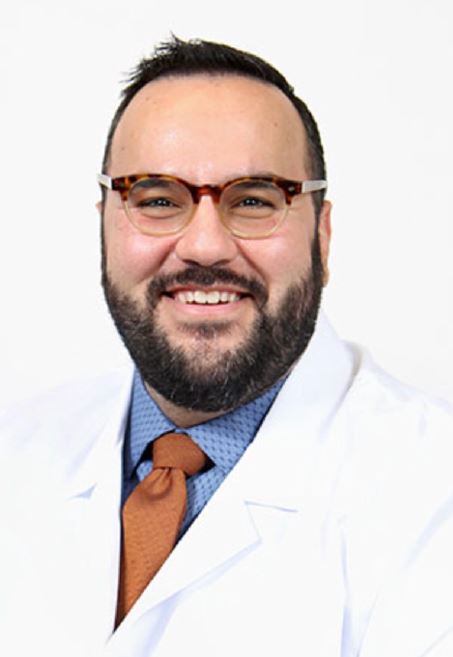 Dr. Khairallah is an Assistant Professor in Clinical Family Medicine at the Indiana University School of Medicine. He is double board certified in family medicine and addiction medicine. He completed medical school at A.T. Still University Kirksville College of Osteopathic Medicine followed by residency training in family medicine at Northwestern McGaw Medical Center. He continued on to the Stanford University Department of Psychiatry and Behavioral Health where he completed fellowship training in addiction medicine. During this time, he was a REACH fellow in Cohort 3 and completed research focusing on screening, diagnosis, and treatment of OUD in patients identifying as BIPOC. He went on to start a dual-diagnosis clinic at Eskenazi Health, a county operated and federally qualified health care system, in Indianapolis, Indiana where his practice primarily focuses on the treatment of patients with substance use disorders and co-occurring psychiatric diagnoses. Dr. Khairallah’s mission is to address the cultural and psychosocial barriers that exist in communities of color with the hope of increasing addiction treatment in the primary care setting. This involves taking a collaborative multidisciplinary approach to acknowledge and mitigate obstacles to sobriety including decades of intergenerational substance use, over-policing, and disinvestment in these communities. Dr. Khairallah also has a deep passion for educating the next generation of addiction providers. He serves as the Director of the Summer Scholar Program in Addiction Medicine for IU medical students, an elective preceptor for the Adolescent Medicine Fellowship Program at Riley Children’s Hospital, and assists with the clinical education of medical students at the Marian University School of Osteopathic Medicine. He is beyond excited to continue as a mentor and welcome the next cohort of scholars to the REACH family!
Dr. Khairallah is an Assistant Professor in Clinical Family Medicine at the Indiana University School of Medicine. He is double board certified in family medicine and addiction medicine. He completed medical school at A.T. Still University Kirksville College of Osteopathic Medicine followed by residency training in family medicine at Northwestern McGaw Medical Center. He continued on to the Stanford University Department of Psychiatry and Behavioral Health where he completed fellowship training in addiction medicine. During this time, he was a REACH fellow in Cohort 3 and completed research focusing on screening, diagnosis, and treatment of OUD in patients identifying as BIPOC. He went on to start a dual-diagnosis clinic at Eskenazi Health, a county operated and federally qualified health care system, in Indianapolis, Indiana where his practice primarily focuses on the treatment of patients with substance use disorders and co-occurring psychiatric diagnoses. Dr. Khairallah’s mission is to address the cultural and psychosocial barriers that exist in communities of color with the hope of increasing addiction treatment in the primary care setting. This involves taking a collaborative multidisciplinary approach to acknowledge and mitigate obstacles to sobriety including decades of intergenerational substance use, over-policing, and disinvestment in these communities. Dr. Khairallah also has a deep passion for educating the next generation of addiction providers. He serves as the Director of the Summer Scholar Program in Addiction Medicine for IU medical students, an elective preceptor for the Adolescent Medicine Fellowship Program at Riley Children’s Hospital, and assists with the clinical education of medical students at the Marian University School of Osteopathic Medicine. He is beyond excited to continue as a mentor and welcome the next cohort of scholars to the REACH family!
Britney Lambert, MD
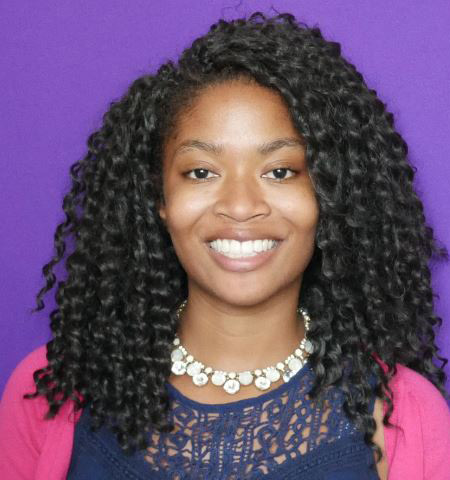 Britney Lambert, MD is a board certified psychiatrist and Assistant Professor of Psychiatry at Baylor College of Medicine. Dr. Lambert graduated from Spelman College and Boston University School of Medicine. She completed residency at LSU-New Orleans where she served proudly as the resident chair of diversity and inclusion. Following residency she completed addiction psychiatry fellowship at Baylor College of Medicine. Dr. Lambert currently spends her clinical time as emergency psychiatry faculty at Ben Taub Hospital, a level one trauma center in Houston. She also serves on the executive board of the Texas Mental Health Equity Mentorship Network for Baylor College of Medicine. In her free time, Dr. Lambert enjoys spending time with her family in her hometown of Fort Lauderdale.
Britney Lambert, MD is a board certified psychiatrist and Assistant Professor of Psychiatry at Baylor College of Medicine. Dr. Lambert graduated from Spelman College and Boston University School of Medicine. She completed residency at LSU-New Orleans where she served proudly as the resident chair of diversity and inclusion. Following residency she completed addiction psychiatry fellowship at Baylor College of Medicine. Dr. Lambert currently spends her clinical time as emergency psychiatry faculty at Ben Taub Hospital, a level one trauma center in Houston. She also serves on the executive board of the Texas Mental Health Equity Mentorship Network for Baylor College of Medicine. In her free time, Dr. Lambert enjoys spending time with her family in her hometown of Fort Lauderdale.
Myra L. Mathis-Uwanogho, MD
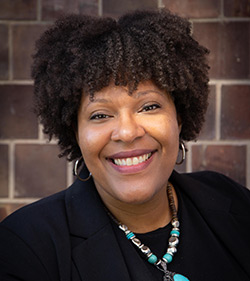 Myra L. Mathis, MD, is a faculty member and board-certified General Adult and Addiction Psychiatrist at the University of Rochester Department of Psychiatry. An undergraduate and medical school alumnus of the University of Rochester, Dr. Mathis trained in General Adult and Addiction Psychiatry at Yale University School of Medicine. She is currently the Medical Director for Strong Recovery, UR Medicine’s outpatient co-occurring disorders clinic which houses an Opioid Treatment Program and provides a full range of addiction and psychiatric services. Contributing author to several peer reviewed articles and book chapters, Dr. Mathis academic interests include racial health equity and social justice in psychiatry and addiction, and medical education for students, residents and fellows in the treatment of substance use disorders.
Myra L. Mathis, MD, is a faculty member and board-certified General Adult and Addiction Psychiatrist at the University of Rochester Department of Psychiatry. An undergraduate and medical school alumnus of the University of Rochester, Dr. Mathis trained in General Adult and Addiction Psychiatry at Yale University School of Medicine. She is currently the Medical Director for Strong Recovery, UR Medicine’s outpatient co-occurring disorders clinic which houses an Opioid Treatment Program and provides a full range of addiction and psychiatric services. Contributing author to several peer reviewed articles and book chapters, Dr. Mathis academic interests include racial health equity and social justice in psychiatry and addiction, and medical education for students, residents and fellows in the treatment of substance use disorders.
Dymon Morgan, MD
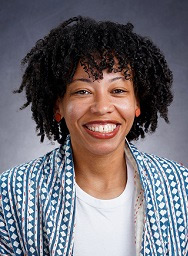 Addiction Medicine Physician at Cooper University Health Care. Completed Addiction Medicine Fellowship at University of California San Francisco, San Francisco. Attended Morehouse School of Medicine in Atlanta for her medical degree and completed her residency in Family Medicine at Saint Louis University, Saint Louis. During residency she developed a passion to partner with individuals with substance use disorders as they created their narrative to be the best version of themselves. Taught high school in Houston and then taught abroad in South Korea.
Addiction Medicine Physician at Cooper University Health Care. Completed Addiction Medicine Fellowship at University of California San Francisco, San Francisco. Attended Morehouse School of Medicine in Atlanta for her medical degree and completed her residency in Family Medicine at Saint Louis University, Saint Louis. During residency she developed a passion to partner with individuals with substance use disorders as they created their narrative to be the best version of themselves. Taught high school in Houston and then taught abroad in South Korea.
Srinivas Muvvala, MD, MPH
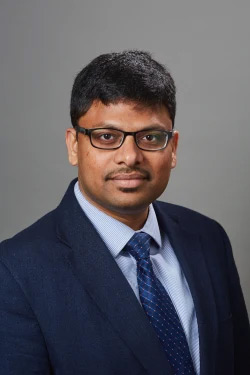 Dr. Muvvala is an Associate Professor of Psychiatry and Associate Program Director for the Addiction Psychiatry Fellowship at the Yale School of Medicine and the Medical Director of the Substance Abuse Treatment Unit (SATU) at the Connecticut Mental Health Center. He oversees the educational, clinical and research programs at SATU and provides medical student, residency, and fellowship education. He received the American Psychiatric Association’s Irma Bland award for resident education in Psychiatry for 2021. His clinical and research interests are in investigating and disseminating optimal pharmacotherapies for the treatment of opioid, tobacco, and alcohol use disorders and in providing integrated treatment for individuals with comorbid substance use, medical and psychiatric disorders.
Dr. Muvvala is an Associate Professor of Psychiatry and Associate Program Director for the Addiction Psychiatry Fellowship at the Yale School of Medicine and the Medical Director of the Substance Abuse Treatment Unit (SATU) at the Connecticut Mental Health Center. He oversees the educational, clinical and research programs at SATU and provides medical student, residency, and fellowship education. He received the American Psychiatric Association’s Irma Bland award for resident education in Psychiatry for 2021. His clinical and research interests are in investigating and disseminating optimal pharmacotherapies for the treatment of opioid, tobacco, and alcohol use disorders and in providing integrated treatment for individuals with comorbid substance use, medical and psychiatric disorders.
Alyssa F. Peterkin, MD
 Alyssa F. Peterkin, MD, is an Assistant Professor of Medicine at Boston University Chobanian & Avedisian School of Medicine and on staff in the Section of General Internal Medicine at Boston Medical Center (BMC). Her leadership roles include program director for the Grayken Addiction Medicine Fellowship at BMC. She is LEADs (Learn, Experience, Advocate, Discover, and Serve) Addiction and Health Track Co-Director at the Chobanian & Avedisian School of Medicine. Dr. Peterkin spends her clinical time caring for patients in the inpatient setting as a hospitalist and an attending on the addiction consultation service. She also provides low barrier access treatment at the substance use disorder urgent care center, Faster Paths. Her clinical, educational and research interests include expanding access to substance use disorder treatment and bridging the gap in addiction education for learners at all levels.
Alyssa F. Peterkin, MD, is an Assistant Professor of Medicine at Boston University Chobanian & Avedisian School of Medicine and on staff in the Section of General Internal Medicine at Boston Medical Center (BMC). Her leadership roles include program director for the Grayken Addiction Medicine Fellowship at BMC. She is LEADs (Learn, Experience, Advocate, Discover, and Serve) Addiction and Health Track Co-Director at the Chobanian & Avedisian School of Medicine. Dr. Peterkin spends her clinical time caring for patients in the inpatient setting as a hospitalist and an attending on the addiction consultation service. She also provides low barrier access treatment at the substance use disorder urgent care center, Faster Paths. Her clinical, educational and research interests include expanding access to substance use disorder treatment and bridging the gap in addiction education for learners at all levels.
Camille Broussard Robinson, MPH
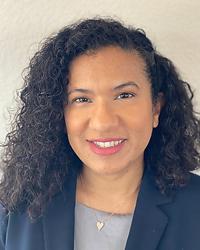 Assistant Professor in the Division of Pediatrics at the Johns Hopkins University School of Medicine in the Division of Adolescent & Young Adult Medicine, Public health-trained and board-certified Pediatrics, Adolescent Medicine, and Addiction Medicine specialist. Provides primary care and subspecialty consultative care to adolescents and young adults in the Center for Adolescent and Young Adult Health at Johns Hopkins Harriet Lane Clinic and provides subspeciality care for adolescents and young adults with Chronic Fatigue Syndrome, Postural Orthostatic Techycardia Syndrome (POTS), and Long COVID in the Johns Hopkins Children’s Center Chronic Fatigue Clinic. Serves in several leadership roles including as Associate Director for the Adolescent Medicine fellowship program at Johns Hopkins and as Director of Research for the Chronic Fatigue Program at Johns Hopkins Children’s Center. As a clinician-scientist, her focus has been on the equitable care of underserved, medically and socially complex adolescent and young adult population.
Assistant Professor in the Division of Pediatrics at the Johns Hopkins University School of Medicine in the Division of Adolescent & Young Adult Medicine, Public health-trained and board-certified Pediatrics, Adolescent Medicine, and Addiction Medicine specialist. Provides primary care and subspecialty consultative care to adolescents and young adults in the Center for Adolescent and Young Adult Health at Johns Hopkins Harriet Lane Clinic and provides subspeciality care for adolescents and young adults with Chronic Fatigue Syndrome, Postural Orthostatic Techycardia Syndrome (POTS), and Long COVID in the Johns Hopkins Children’s Center Chronic Fatigue Clinic. Serves in several leadership roles including as Associate Director for the Adolescent Medicine fellowship program at Johns Hopkins and as Director of Research for the Chronic Fatigue Program at Johns Hopkins Children’s Center. As a clinician-scientist, her focus has been on the equitable care of underserved, medically and socially complex adolescent and young adult population.
Christopher Rashad Smith, MD
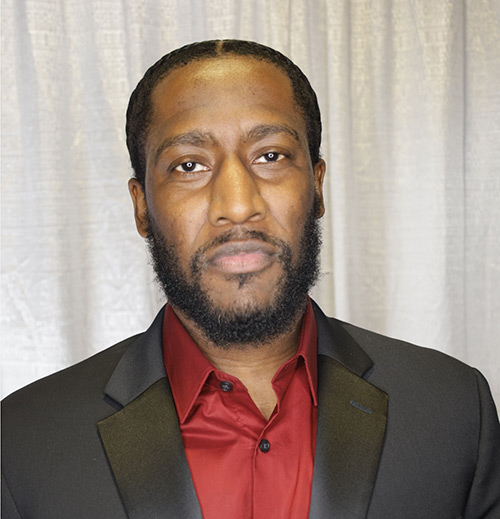 “Christopher Rashad Smith, M.D. is a double American Board of Psychiatry and Neurology certified Addiction Psychiatry and General Psychiatry physician. He currently serves as the Associate Program Director for Emory University School of Medicine Addiction Psychiatry fellowship program in addition to leading two ASAM Level II intensive outpatient programs (IOP) in addition to several other clinics and duties through the Department of Veteran Affairs. He completed advanced clinical training in Addiction Psychiatry at Emory University School of Medicine, where in addition to his clinical fellowship duties, Dr. Smith also worked part time emergency psychiatric services for Grady Memorial Hospital and through the admissions department at the Georgia Department of Behavior and Developmental Disability. These are two of the largest provider systems in the state. He is actively involved in multiple local and national societies, including the American Academy of Addiction Psychiatry and the American Society of Addiction Medicine, and is a former co-chair for the Doctors for America Substance Use Disorder Subdivision.
“Christopher Rashad Smith, M.D. is a double American Board of Psychiatry and Neurology certified Addiction Psychiatry and General Psychiatry physician. He currently serves as the Associate Program Director for Emory University School of Medicine Addiction Psychiatry fellowship program in addition to leading two ASAM Level II intensive outpatient programs (IOP) in addition to several other clinics and duties through the Department of Veteran Affairs. He completed advanced clinical training in Addiction Psychiatry at Emory University School of Medicine, where in addition to his clinical fellowship duties, Dr. Smith also worked part time emergency psychiatric services for Grady Memorial Hospital and through the admissions department at the Georgia Department of Behavior and Developmental Disability. These are two of the largest provider systems in the state. He is actively involved in multiple local and national societies, including the American Academy of Addiction Psychiatry and the American Society of Addiction Medicine, and is a former co-chair for the Doctors for America Substance Use Disorder Subdivision.
A native of Spartanburg, South Carolina, Dr. Smith completed undergraduate studies at Erskine College, where he graduated magna cum laude with a Bachelor of Science in Biology. He would subsequently earn his Medical Doctorate at the Medical University of South Carolina, where he received the prestigious James B. Edwards Scholarship Award for outstanding academic achievement. During his medical training, he served as Vice President of the Multicultural Student Advisory Board, Vice President of the Psychiatry Interest Group, and he was elected by his peers to the Student Government Association.
Last but far from least, Dr. Smith completed General Psychiatry residency at Morehouse School of Medicine, fulfilling many of his clinical duties at Grady Memorial Hospital and the Department of Veteran Affairs Medical Center in Atlanta, Georgia. During this time, Dr. Smith served in administrative roles such as the Georgia Psychiatric Physician Association (GPPA) Resident Trustee and a member of the Graduate Medical Education (GME) Patient Safety & Quality Improvement (PSQI) Subcommittee. In 2018, he was inducted into the Alpha Omega Alpha Honor Medical Society and in 2019 was recognized with the Departmental Resident of the Year award.
Dr. Smith’s interests include continuing to work within graduate medical education to support a diverse future generation of young clinicians, as well as continuing to expand his versatile skillset to better serve his current and future diverse patient population.
Tamika Chere’ Barkley Zapolski, PhD
 Dr. Tamika Zapolski is an Associate Professor of Psychiatry at the Indiana University School of Medicine. She earned her Ph.D. in Clinical Psychology from the University of Kentucky in 2013. Dr. Zapolski is a clinician working in both the pediatric and adult clinics through IU Health, with clinical expertise in substance use, emotion dysregulation, and Dialectical Behavioral Therapy for both youth and adults. She is the director of the Prevention Research in Substance Use and Minority Health (PRISM) lab, with two complementary lines of research: 1) understanding developmental and culturally based risk and promotive factors to substance use and mental health outcomes among racial/ethnic minority youth, and 2) the implementation of youth substance use and mental health interventions in community, clinical, and school settings. One of her interventions is a brief 9-session adaptation of Dialectical Behavioral Therapy for Adolescents (DBT-A) skills group, that is provided to students at local high schools to reduce adolescent substance use and related health outcomes. Dr. Zapolski is also the Director of Community Engagement for the Indiana University School of Medicine Adolescent Behavioral Health Research Program and the Director of the Indiana University School of Medicine Youth Coalition, which provides mentorship, training, and leadership opportunities related to youth mental health to individuals age 13-18 in the Indianapolis area.
Dr. Tamika Zapolski is an Associate Professor of Psychiatry at the Indiana University School of Medicine. She earned her Ph.D. in Clinical Psychology from the University of Kentucky in 2013. Dr. Zapolski is a clinician working in both the pediatric and adult clinics through IU Health, with clinical expertise in substance use, emotion dysregulation, and Dialectical Behavioral Therapy for both youth and adults. She is the director of the Prevention Research in Substance Use and Minority Health (PRISM) lab, with two complementary lines of research: 1) understanding developmental and culturally based risk and promotive factors to substance use and mental health outcomes among racial/ethnic minority youth, and 2) the implementation of youth substance use and mental health interventions in community, clinical, and school settings. One of her interventions is a brief 9-session adaptation of Dialectical Behavioral Therapy for Adolescents (DBT-A) skills group, that is provided to students at local high schools to reduce adolescent substance use and related health outcomes. Dr. Zapolski is also the Director of Community Engagement for the Indiana University School of Medicine Adolescent Behavioral Health Research Program and the Director of the Indiana University School of Medicine Youth Coalition, which provides mentorship, training, and leadership opportunities related to youth mental health to individuals age 13-18 in the Indianapolis area.
